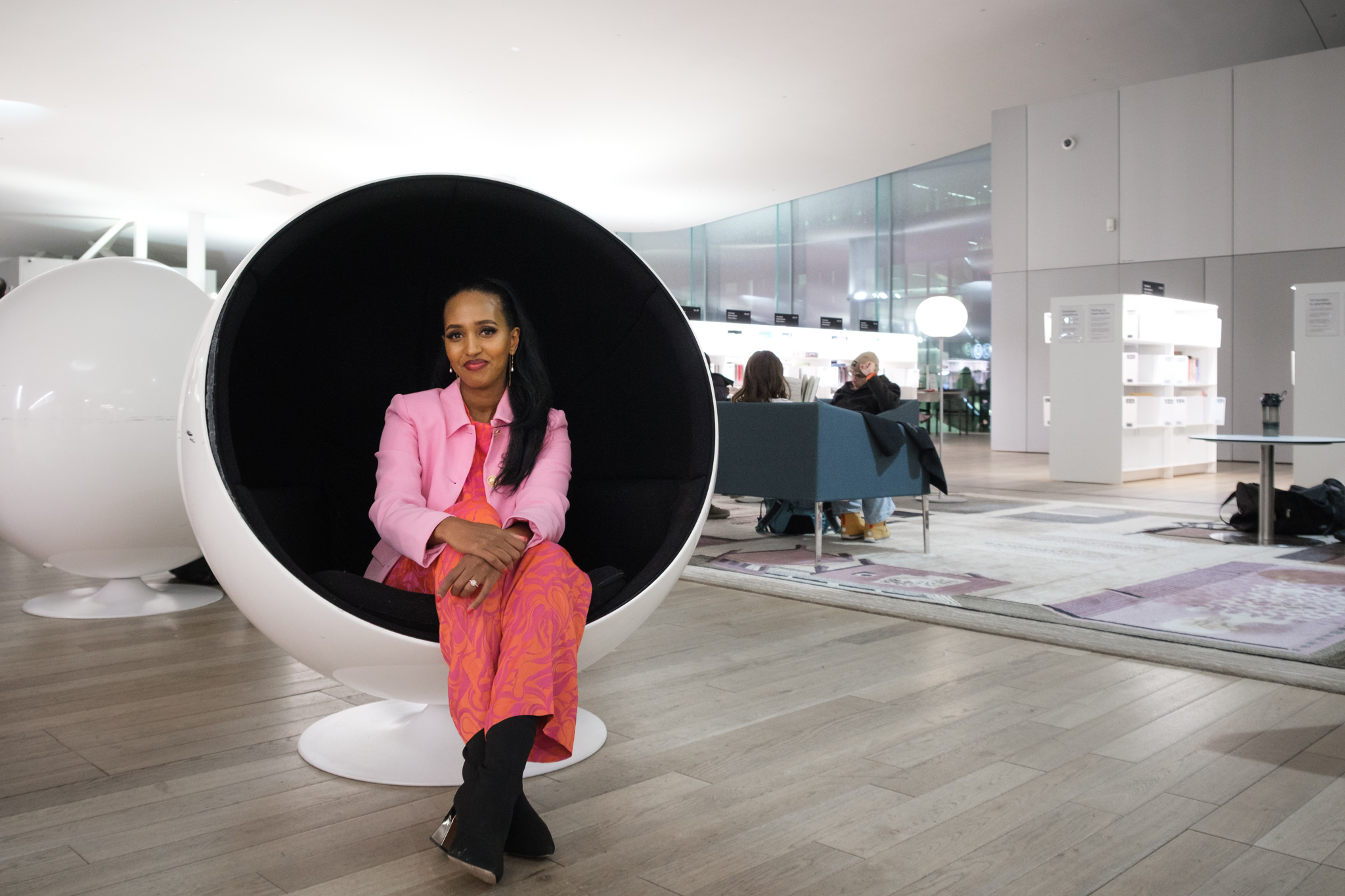Ujuni Ahmed urges people to talk about their problems – political silence only increases the inequalities that minorities face
Ujuni Ahmed is a sought-after expert, Chairperson of the Crisis Response Association, a new mother and an acclaimed author whose work “Tytöille, jotka ajattelevat olevansa yksin” (“For Girls Who Think They Are Alone”) premiered at the Finnish National Theatre in the autumn of 2023. She came to Finland from Somalia with her family in the early 1990s, when the need for the integration of immigrants had not yet been recognized. According to Ahmed, this has led to many of the problems that we face today.

From a young age, Ahmed noticed how women from minority communities and their rights are seen differently than those from the majority community.
“When it comes to minorities, people may attempt to be sensitive in the wrong way; they may believe that some forms of violence are inherent to a particular culture and should be addressed differently than the violence that women belonging to the majority population are subjected to.”
Towards a more minority-focused approach
According to Ahmed, one of the biggest challenges is that women belonging to a minority are not genuinely heard.
“As a result, equality work is not visible in the lives of minority women. Having a discussion is difficult, because it is hindered by fear of offending someone. However, we should always consider who benefits more from the work: the person doing the work, or its target.”
Ahmed is most concerned about political influencing.
“Minority women are heard on certain limited platforms, but it is impossible for these women to get into positions of leadership.”
Advocating against female genital mutilation and pushing the related bill forward has been particularly exhausting for Ahmed.
“I have had to constantly give proof to people why this is important and also why it should not be done according to the white feminist perspective. But how can an outsider see the whole picture if they are not familiar with the culture?”
Immigrants suffer most from failed integration
In the political arena, the discussion surrounding immigration, especially when it comes to refugees, is polarized: racist rhetoric is used to oppose immigration, or people defend immigration so vehemently that they turn a blind eye to its problems. Talking about the issue in a neutral way is difficult, as it may give more momentum to anti-immigration activists. Ahmed says that being silent for the sake of your own agenda only causes more suffering. Violence against immigrant women is manifold, and the perpetrator is often a person with an immigrant background. Not everyone wants to admit this.
Ahmed sees the problems dating back to the early 1990s, when there were no integration measures in place. Nazi skinheads created a climate of fear around them, and the problem was not properly addressed. Mothers stayed at home. Parents were not encouraged to study. We are paying the price for that now.
“Integration is much more difficult than we think. When an immigrant enters a new country, it is not just the country that receives them. Instead, they are met by and become a part of communities that already exist in this new country. When there is already a strong community in place in terms of ethnicity and religion, and you already know someone from that community, the motivation to start studying Finnish or other languages is high. It is easier to just live your life according to the advice you get from the community. Of course, this also depends on the age of the person entering the country.”
This is why focusing only on the newcomers is not enough, and Ahmed calls for attention to be paid to existing minority communities and their structures.
Tackling problems through research
Inequalities and the situation of women can be improved through research, at least to some extent. Ahmed says that our legislation is also very individual-oriented. It does not recognize communal violence or persecution.
“We need to examine the power structures found in immigrant communities that prevent community members from relying on society. We also need to look into parallel societies. Do they exist in Finland? Are there structures that act as substitutes for the police or health care system?”
These distorted structures can be dismantled through research to bring services closer to the people who are already here and to build trust between the authorities and the various communities. But research also has its challenges.
“If the research is conducted only in Finnish, Swedish and English, it will exclude almost everyone who experiences female genital mutilation, as well as a large portion of those who experience honor-based violence. This produces misleading information. The research should be conducted together.”

There is always work to be done for equality
Ahmed does not want to be too gloomy, but she does say that she is a realist. Ahmed says that she does not find year-based deadlines to be a productive tool and that we should stop using them.
“It seems unrealistic to think that one day, globally, everyone will think the same way. People are different. We must not think that 10 or 50 years from now, everything and everyone will be perfectly equal. Being aware of this makes us work harder for equality.”
Also, we should not take the progress we have achieved in equality work so far for granted, as we will face setbacks in that regard as well.
“We have taken peace for granted, we have taken schooling and health care for granted, and look where we are now. We cannot stop our work for equality.”
Crisis Response Association
- Ujuni Ahmed is the Chairperson of the Crisis Response Association.
- The association provides unarmed humanitarian security aid to civilians left without support in crisis and conflict situations, with the aim of supporting the preservation of life and health of civilians in acute situations of inhumanity.
- Founded in 2021, the association is funded through volunteer work, private donations and project funding from the Ministry of Justice.


